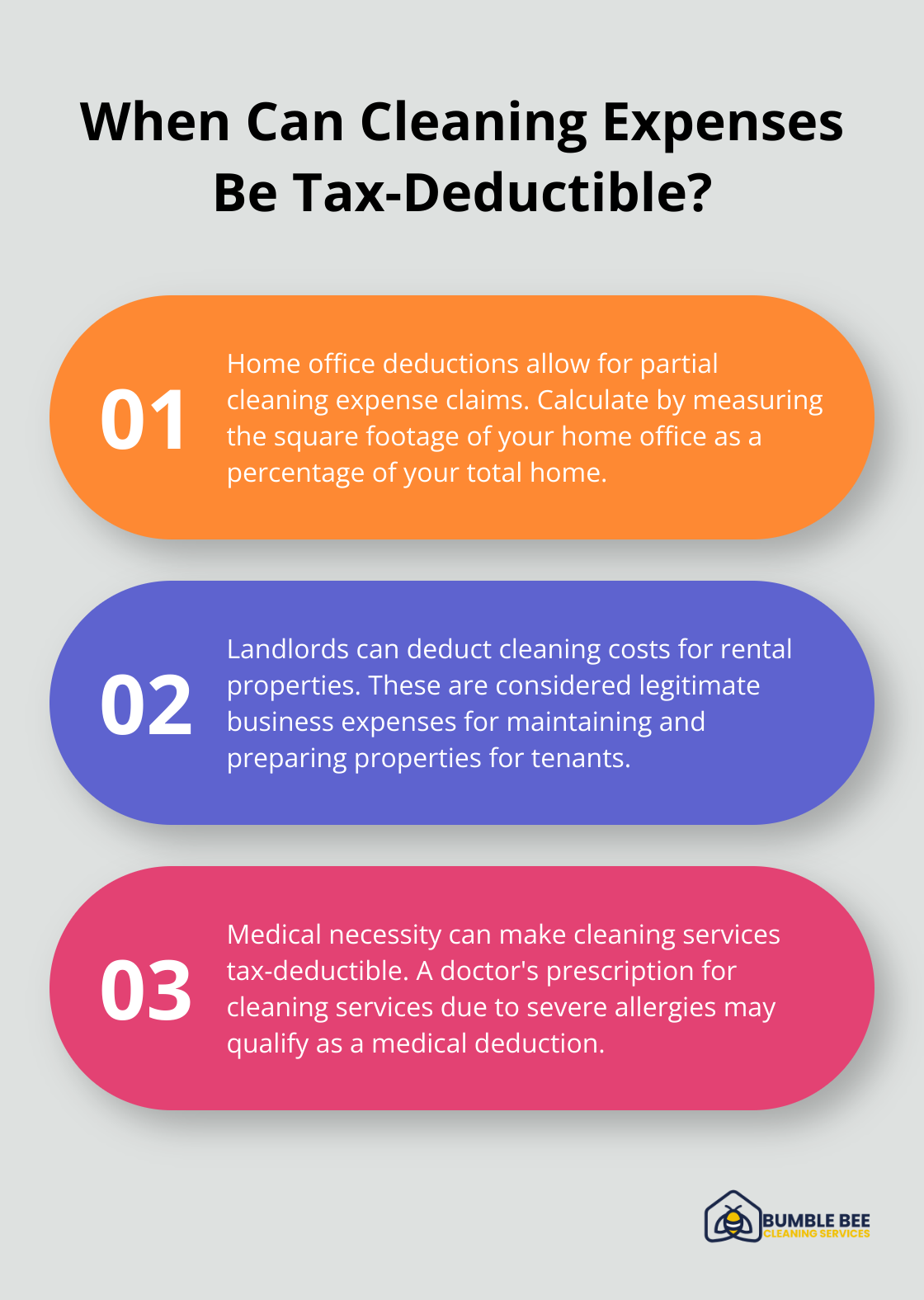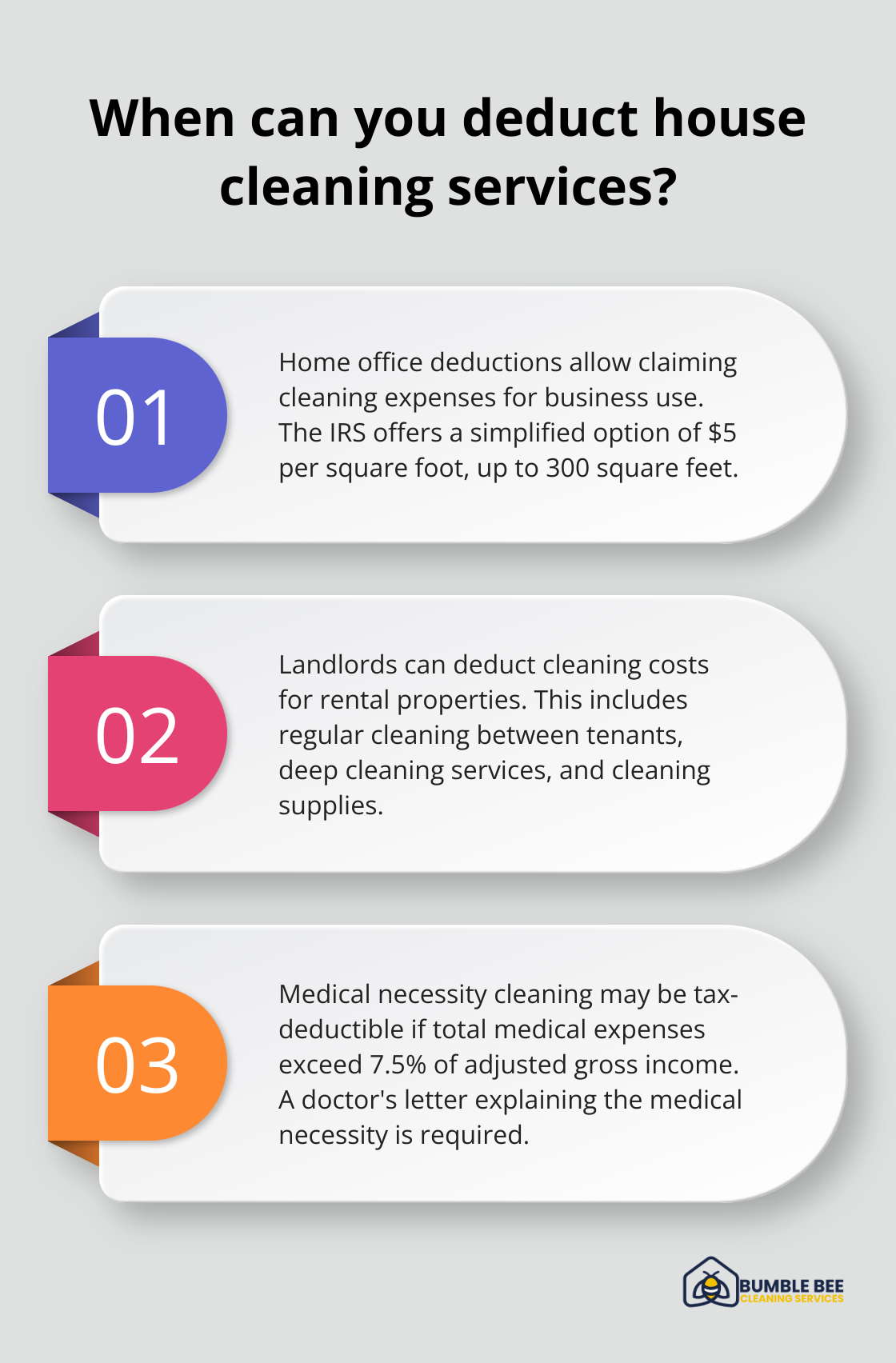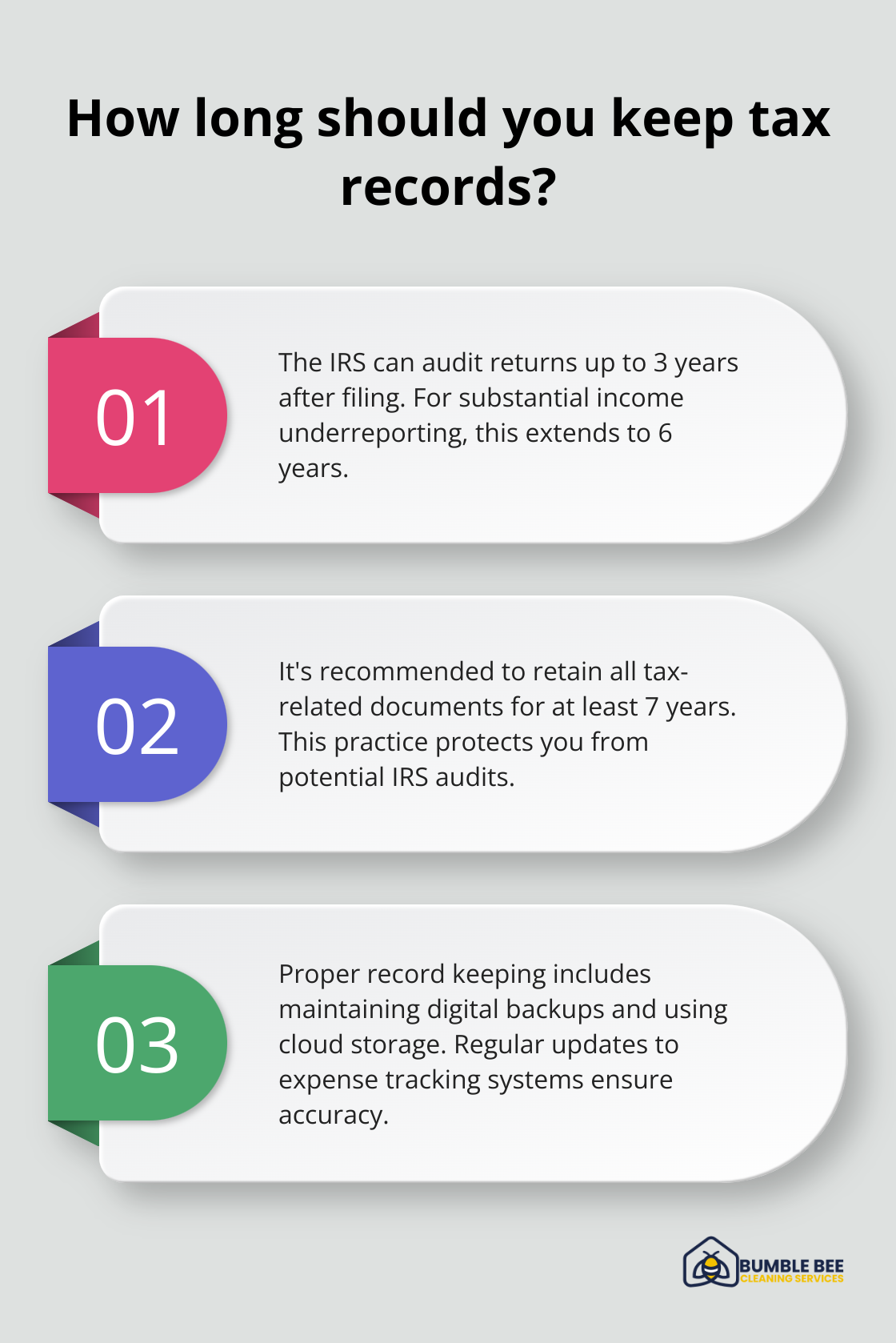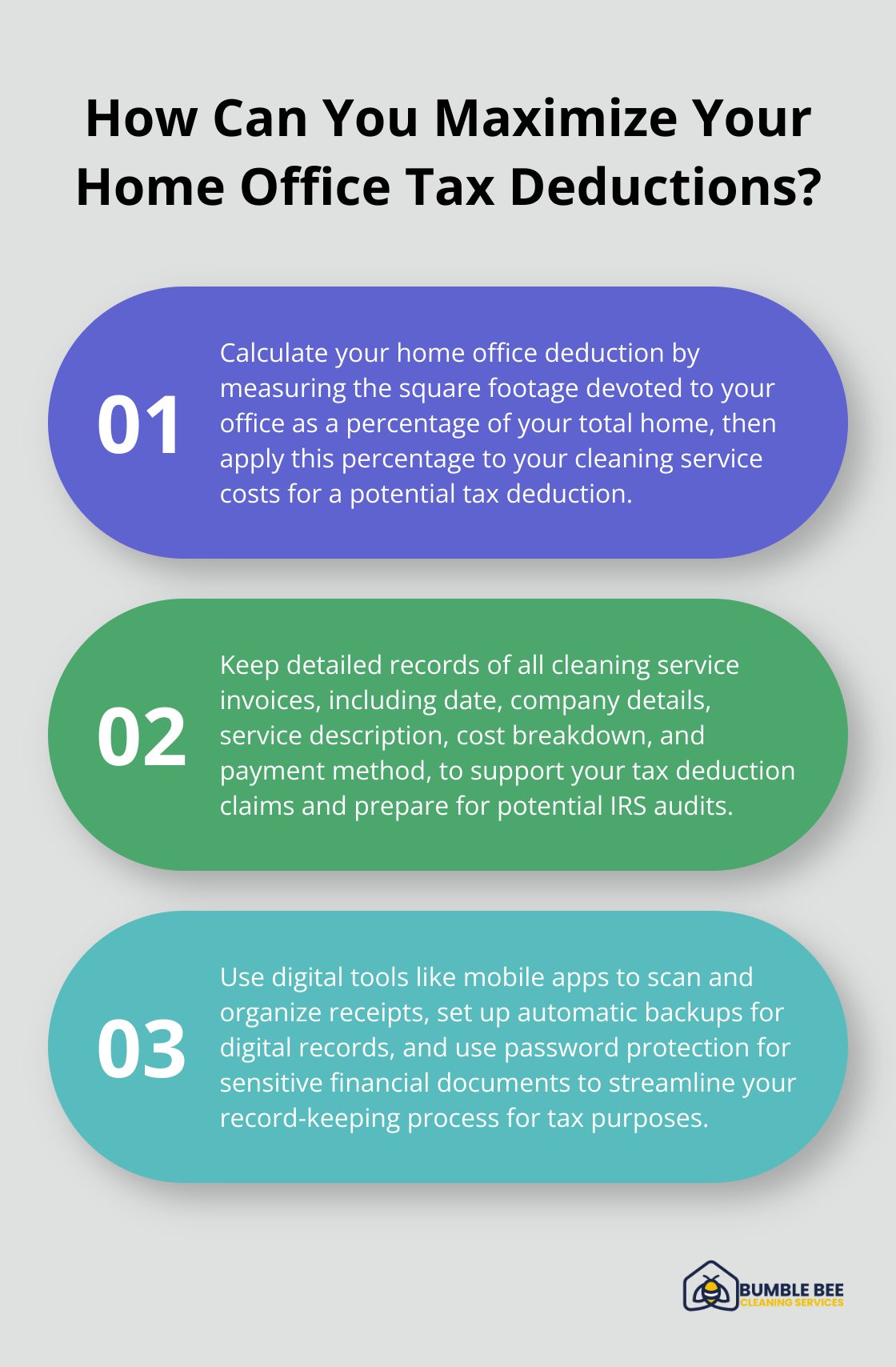Are house cleaning services tax deductible? This question often puzzles homeowners and business owners alike. At Bumble Bee Cleaning Services, we understand the importance of maximizing your tax benefits.
Table of Contents:
In this blog post, we’ll explore the scenarios where cleaning services might be tax-deductible and provide guidance on proper documentation to support your claims.
What Qualifies as a Tax-Deductible Cleaning Expense?
Understanding tax deductions for house cleaning services requires careful consideration of IRS guidelines. While personal cleaning services typically don’t qualify for deductions, certain exceptions exist. Let’s explore the scenarios where cleaning expenses might be tax-deductible.
Business-Related Cleaning Expenses
The IRS allows deductions for expenses that are both ordinary and necessary for business operations. If you use a portion of your home exclusively for business purposes, you may deduct a percentage of your cleaning expenses. This falls under the home office deduction.

For instance, if your home office occupies a portion of your total living space, you could potentially deduct a percentage of your cleaning service costs. The most exact way to calculate this is by measuring the square footage devoted to your home office as a percentage of your total home. Accurate record-keeping of these expenses and the square footage of your home office space is essential.
Rental Property Cleaning Costs
Landlords can deduct cleaning expenses for their rental properties. The IRS considers these costs as legitimate business expenses for rental property owners. These deductions apply to expenses incurred for maintaining the property and preparing it for new tenants.
Medical Necessity Situations
In some cases, cleaning services become tax-deductible if they’re medically necessary. For example, if a doctor prescribes regular cleaning services due to severe allergies or other health conditions, these expenses might qualify as medical deductions. However, it’s important to note that medical care expenses include payments for the diagnosis, cure, mitigation, treatment, or prevention of disease, or payments for treatments.
Documentation Requirements
The IRS strictly enforces documentation for all deductions. You must keep detailed records of all cleaning service invoices, receipts, and any relevant medical documentation. Without proper evidence, the IRS may disallow your deductions in case of an audit.
Consulting a Tax Professional
Tax laws change frequently, and individual circumstances vary. A certified tax professional can provide personalized advice on your specific situation. They can help you navigate the complexities of tax law and ensure you maximize your eligible deductions while staying compliant with IRS regulations.
As we move forward, let’s examine the proper documentation and record-keeping practices that support your cleaning service tax deductions.
When Can You Deduct House Cleaning Services?
House cleaning services can become tax-deductible in specific scenarios. This chapter explores three common situations where you might claim cleaning expenses on your taxes.
Home Office Deductions
If you use a portion of your home exclusively for business purposes, you may qualify to deduct a percentage of your cleaning expenses. The IRS requires this space to be used solely for work. The IRS allows a simplified option for home office deduction, with a standard $5 per square foot of home used for business, not to exceed 300 square feet.

The IRS scrutinizes home office deductions closely, so accuracy is essential. You must maintain meticulous records of your cleaning expenses and prepare to justify the business use of your home space.
Rental Property Expenses
Landlords should note that cleaning costs for rental properties typically qualify as tax-deductible. These expenses fall under the category of ordinary and necessary costs for maintaining and managing a rental property. This includes:
Regular cleaning between tenants
Deep cleaning services
Cost of cleaning supplies
Many cleaning companies provide detailed invoices that itemize all services performed. This level of detail proves invaluable when you file your taxes.
Medical Necessity Situations
In some cases, you can deduct cleaning services as a medical expense. The IRS generally allows a deduction for expenses paid during the taxable year for medical care if certain requirements are met. However, the IRS sets a high bar for this deduction – your total medical expenses must exceed 7.5% of your adjusted gross income for the year.
To claim this deduction, you need more than just receipts from your cleaning service. A letter from your doctor explaining the medical necessity of the cleaning services is essential. Additionally, you should keep a log of how the cleaning services specifically relate to your medical condition.
Documentation Requirements
The IRS enforces strict documentation rules for all deductions. You must keep detailed records of all cleaning service invoices and receipts. For medical deductions, retain relevant medical documentation as well. Without proper evidence, the IRS may disallow your deductions in case of an audit.
Consulting a Tax Professional
Tax laws change frequently, and individual circumstances vary. A certified tax professional can provide personalized advice on your specific situation. They can help you navigate the complexities of tax law and ensure you maximize your eligible deductions while staying compliant with IRS regulations.
As we move forward, let’s examine the proper documentation and record-keeping practices that support your cleaning service tax deductions.
How to Keep Proper Records for Cleaning Service Tax Deductions
Essential Information for Cleaning Service Receipts
The IRS requires specific details on cleaning service receipts to support tax deduction claims. Your receipts should include:
- Service date
- Cleaning company’s name and address
- Detailed service description
- Cost breakdown
- Total amount paid
- Payment method

Many professional cleaning companies (including Bumble Bee Cleaning Services) provide itemized invoices that meet these criteria, which simplifies record-keeping for tax purposes.
Effective Organization of Tax-Related Documents
Proper organization of tax-related documents streamlines the tax filing process. Consider these practical tips:
- Dedicate a folder or digital file for cleaning service receipts and invoices.
- Digitize paper receipts to prevent loss or fading.
- Use a spreadsheet to track cleaning expenses (categorize by date, amount, and purpose).
- Store medical documentation with cleaning records for medical necessity claims.
- Maintain a separate log for home office cleaning expenses.
Long-Term Record Keeping Best Practices
The IRS can audit returns up to three years after filing (or up to six years for substantial income underreporting). Protect yourself with these practices:
- Retain all tax-related documents for at least seven years.
- Back up digital records using cloud storage solutions.
- Update your expense tracking system regularly for accuracy.
- Consider accounting software designed for small businesses or self-employed individuals to streamline record-keeping.
Digital Tools for Efficient Record Keeping
Leverage technology to simplify your record-keeping process:
- Use mobile apps to scan and organize receipts on-the-go.
- Explore expense tracking apps that integrate with your accounting software.
- Set up automatic backups for your digital records.
- Use password protection and encryption for sensitive financial documents.
Handling Special Cases
Some tax deductions require additional documentation:
- For home office deductions, maintain a floor plan showing the dedicated work area.
- For rental property expenses, keep a separate log for each property.
- For medical necessity claims, obtain and store written documentation from your healthcare provider.
These guidelines will prepare you to claim cleaning service deductions accurately on your tax return. Proper documentation protects you from potential issues with the IRS and maximizes your tax benefits.
Final Thoughts
House cleaning services can be tax deductible in specific scenarios such as home offices, rental properties, and medical necessities. Accurate record-keeping and understanding IRS guidelines are essential for claiming these deductions. We recommend consulting a qualified tax professional to navigate the complexities of tax law and maximize eligible deductions while remaining compliant with regulations.

Professional cleaning services offer benefits beyond potential tax advantages, including maintaining a clean and healthy environment. At Bumble Bee Cleaning Services, we provide comprehensive cleaning solutions for residential and commercial spaces, using eco-friendly products and offering a 100% quality guarantee. Our expert team delivers top-notch results that contribute to overall well-being and productivity.
The value of professional cleaning extends far beyond tax returns, saving time and providing peace of mind. Investing in quality cleaning services creates a comfortable space where you can thrive (both personally and professionally). We invite you to experience the difference of our exceptional cleaning services and discover how they can enhance your living or working environment.
